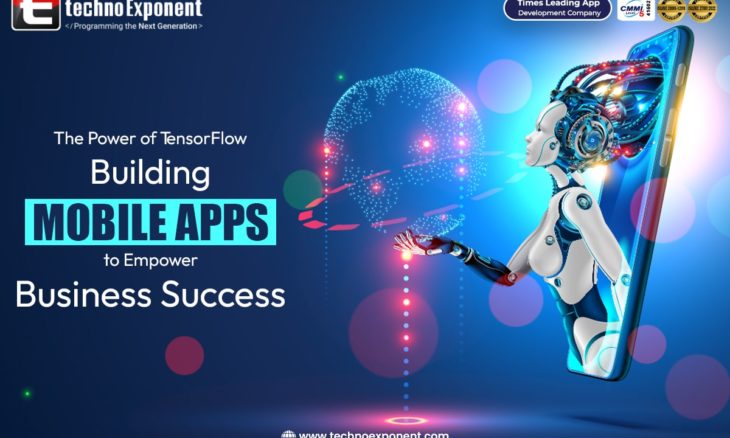
In the dynamic landscape of business, mobile apps have become integral tools for engagement and success. For business persons seeking innovative solutions, TensorFlow emerges as a game-changer. This blog delves into the transformative potential of building mobile apps with TensorFlow, offering insights into its capabilities and impact on business growth.
Understanding TensorFlow: A Brief Overview
TensorFlow, developed by Google, is renowned for its versatility in machine learning and deep neural networks. In the context of mobile app development, TensorFlow serves as a powerful tool for integrating machine learning capabilities seamlessly. This technology makes apps more intuitive and user-friendly by learning from and adapting to user interactions.
Key Features of TensorFlow in Mobile App Development
Efficient Model Training: TensorFlow simplifies the process of training models, allowing businesses to optimize their apps for specific tasks.
Cross-Platform Compatibility: TensorFlow supports both Android and iOS, ensuring that businesses can reach a wide audience with a single codebase.
On-Device Inference: With TensorFlow Lite, on-device inference becomes a reality, enhancing app performance and user experience.
Real-world Applications: Business Solutions with TensorFlow
TensorFlow’s impact extends across various industries, offering practical solutions for business persons:
Enhanced Customer Engagement: TensorFlow facilitates the creation of personalized user experiences through predictive analytics, enhancing customer engagement.
Fraud Detection and Security: In financial sectors, TensorFlow’s capabilities are harnessed for real-time fraud detection, ensuring robust security measures.
Supply Chain Optimization: Businesses optimize their supply chain operations by leveraging TensorFlow for demand forecasting and inventory management.
Tensorflow Works & Architecture
TensorFlow, a robust open-source framework designed for developing and deploying machine learning models, especially those employing deep learning, operates on a structured architecture consisting of three pivotal components:
Data Flow Graphs:
TensorFlow constructs computations in the form of directed graphs, where nodes represent operations (e.g., matrix multiplication, activation functions), and edges depict the flow of data tensors between these operations. This graphical representation enhances the clarity of complex computations, facilitating efficient execution.
Tensors:
Tensors serve as the backbone of TensorFlow’s architecture. These multi-dimensional arrays hold various types of data, including images, text, or numerical values. In the context of the data flow graph, tensors act as both input and output for different operations. TensorFlow supports diverse data types for tensors, ensuring adaptability to handle various kinds of data effectively.
Eager Execution and Symbolic Execution:
TensorFlow provides two distinct execution modes, each serving specific purposes:
Eager Execution: This mode executes operations immediately as they are defined. It offers a more interactive and flexible approach, particularly beneficial for experimentation and debugging during the development phase.
Symbolic Execution: In this mode, TensorFlow creates the data flow graph without immediate execution. This allows for optimization and efficient deployment on various platforms. Symbolic execution enhances the framework’s ability to handle complex computations and streamline the deployment process.
In essence, TensorFlow’s architecture is designed to leverage the strengths of data flow graphs, tensors, and dual execution modes, providing a versatile and powerful platform for developing and deploying machine learning models. Understanding these architectural components is crucial for developers and data scientists seeking to harness the full potential of TensorFlow in building advanced and efficient ML applications.
Benefits of TensorFlow for Business Persons
Cost Efficiency: TensorFlow streamlines development processes, reducing costs associated with app creation and maintenance.
Competitive Edge: Embracing TensorFlow provides a competitive edge, enabling business persons to offer cutting-edge solutions and services.
Data-Driven Decision Making: TensorFlow’s analytics capabilities empower business persons with valuable insights, fostering data-driven decision-making.
Conclusion
TensorFlow emerges as a potent ally for business persons venturing into mobile app development. Its capabilities transcend traditional boundaries, offering a myriad of opportunities for innovation and growth. By embracing TensorFlow, business persons can build intelligent, efficient, and user-centric mobile apps that redefine their industry presence. The future of business success lies in the transformative potential of TensorFlow and now is the time to seize it. Unlock new possibilities, enhance user experiences, and propel your business toward unprecedented heights with TensorFlow-powered mobile apps
 +44 141 628 8980
+44 141 628 8980
 (786) 269-2247
(786) 269-2247
 +61 872007153
+61 872007153
 +91 8900027268 (Sales only)
+91 8900027268 (Sales only)








